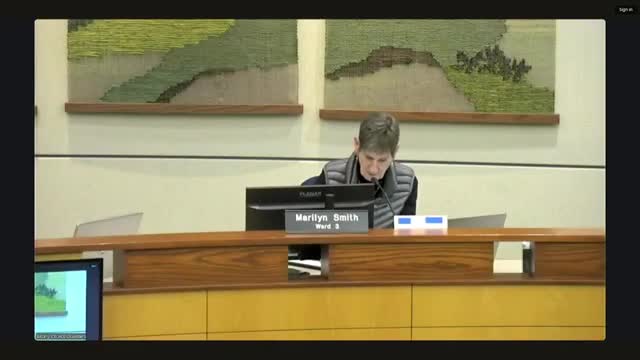Albany council upholds planning commission denial of 506 Ferry Street treatment center
Get AI-powered insights, summaries, and transcripts
Subscribe
Summary
On Oct. 22, 2025, the Albany City Council upheld the planning commission's May denial of a conditional-use request to operate an outpatient drug- and alcohol-treatment center at 506 Ferry Street Southwest, citing that the applicant on appeal remained the for‑profit entity that applied to the planning commission.
Albany City Council on Oct. 22 upheld the planning commission’s denial of a conditional‑use application to operate an outpatient drug- and alcohol‑treatment center at 506 Ferry Street Southwest, a contributing property in the Hackleman‑Monteith Historic District.
The vote affirmed the planning commission’s May 19, 2025 decision after city staff and the city attorney told the council that the appellant before them was the for‑profit entity that originally applied. The council’s action means the applicant will need to file a new application if it wishes to pursue approval as a different legal entity.
Project planner and planning manager David Martineau told councilors the property is in the Hackleman‑Monteith zoning district and that the development code (Article 22 and conditional‑use review criteria at ADC 2.25) treats a “community service” use as one operated by government, a nonprofit or a charitable organization. The planning commission denied the application 5–3 in May on the basis that the facility before it was a for‑profit LLC. Martineau noted the applicants later filed articles of incorporation on Sept. 4, 2025 to create a domestic nonprofit but said any new nonprofit application must be submitted anew to the planning commission rather than substituted mid‑appeal.
The city attorney gave the same legal framing: the appeal is a de novo review of the application that was before the planning commission, and the council must base its decision on the applicant and facts that were presented at that time. The attorney said the newly formed nonprofit is a separate legal entity that would require a separate application and public notice.
Applicants and supporters told the council they changed corporate status in response to planning feedback and argued the center would operate with substantial community‑based services rather than as a conventional commercial enterprise. Celia Cicada, project manager at Veritone Architecture, said the change was made “as a direct response of the denial in May” and that the applicant is “happy to engage in all those conversations in good faith.” Angela Kelly, listed by the applicant as an owner, said the nonprofit was created “because they said that’s what it needed to be.” Applicants said they had invested in interior repairs and would continue to preserve the house’s historic character.
Opponents and several councilors raised concerns about compatibility with the predominantly residential character of the Hackleman‑Monteith district, parking and transportation impacts near the courthouse, and the risk that a nonprofit designation could be used to circumvent notice and review. Neighbors and other speakers said the location is not appropriate for a service with frequent client visits and staff activity and warned that interior changes for a business use could make it unlikely the structure would return to residential use.
Council deliberations emphasized two recurring points: (1) whether the use fits the conditional‑use criteria for the historic residential zone, particularly transportation/parking and neighborhood character; and (2) whether the council could treat a different legal applicant than the one that applied to the planning commission. Several councilors said they support substance‑use treatment services in Albany but concluded the proper remedy was for the applicant to refile as the nonprofit and return to the planning commission for fresh public notice and review. The city attorney warned that an approval inconsistent with the planning commission’s basis for denial could be remanded on appeal to the Land Use Board of Appeals (LUBA).
After deliberation a motion to uphold the planning commission’s denial carried. The council’s action upholds the planning commission ruling that, as presented to that body in May, the applicant did not meet the code’s nonprofit/charitable test for the “community service” category and therefore the conditional use could be denied. The city recorder read the council’s oral action as upholding the planning commission’s decision. The council noted that anyone with standing may appeal the decision to LUBA within the statutory period.
The decision leaves the applicants able to file a new conditional‑use application under the nonprofit entity if they wish; staff and the city attorney advised that filing a new application would provide public notice and allow the planning commission and council to consider the nonprofit’s documentation and operations as a fresh matter.
Votes at a glance: Motion to uphold the Planning Commission denial of the conditional‑use application for 506 Ferry Street Southwest — motion passed (voice vote). The council did not record a roll‑call tally in the meeting transcript excerpt; the city’s official minutes will carry the certified vote record and any conditions for further action.
What’s next: The council’s written decision will be posted in the city record. The applicants may file a new conditional‑use application as a nonprofit, or an interested party may file a notice of intent to appeal the council’s decision to the Land Use Board of Appeals within 21 days of the final decision.
